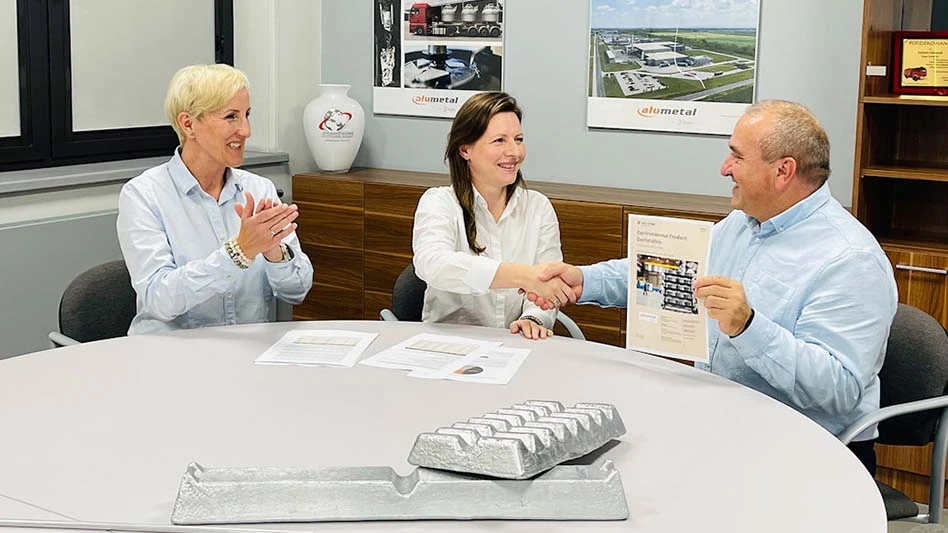
Photo courtesy of Norsk Hydro ASA
Poland-based aluminum producer Alumetal has completed an environmental product declaration (EPD) to document the environmental footprint of its recycled foundry alloy aluminum products.
Alumetal, which Norway-based Norsk Hydro ASA acquired last year, says the EPD is based on an independent third-party study and provides full transparency of the mixture of scrap qualities used to make recycled foundry alloy (RFA) at its plants.
“The product declaration not only validates Hydro's and Alumetal’s commitment to drive sustainability and responsibility in the aluminum industry but also provides our customers and partners with exact knowledge of the environmental impact of their supply chain,” says Hanne Simensen, executive vice president at Hydro Aluminium Metal.
Hydro and Alumetal say recycling more postconsumer scrap “is vital to accelerate emission cuts,” adding that transparency about the origins of the metal is becoming increasingly important due to growing consumer awareness and regulatory demand.
“Our customers are becoming more and more conscious about where and how materials are produced,” says Agnieszka Drzyżdżyk, CEO of Alumetal. “The completion of this EPD marks an important step, as it gives a clear picture of the environmental impact and carbon footprint of our aluminum products. We are proud to provide our customers with the data they need to make informed choices, which ultimately will help them reach their sustainability goals.”
The aluminum producers make a distinction between preconsumer scrap originating from aluminum production processes and postconsumer scrap (PCS). The latter, Hydro and Alumetal say, “comes with a carbon footprint close to zero, since emissions have already been accounted for.”
Alumetal’s four recycling plants, three in Poland and one in Hungary, have a total capacity of 280,000 metric tons per year and predominantly serve the automotive sector.
“Alumetal’s plants use up to 94 percent recycled materials in the production of foundry alloys,” Hydro says, adding that the total includes more than 50 percent postconsumer scrap.
The result for Alumetal’s recycled foundry alloy products is an average carbon footprint of 2.44 kilograms of CO2-equivalent emissions per kilogram of aluminum made. Hydro calls that “less than one-sixth of the global average in primary aluminum production, with most emissions coming from the upstream production of materials.”
According to Hydro, “The use of the byproduct allocation method is what sets Alumetal’s EPD apart. By accurately distinguishing between pre- and postconsumer scrap, the environmental benefits of using PCS are properly addressed. Alumetal has been pioneering recycling of challenging postconsumer aluminum scrap to prevent a valuable resource from ending up in landfills.”
Simensen says, “Alumetal is key in our efforts to source more postconsumer scrap and develop advanced sorting technologies to allow an increased amount of used aluminum to be given a new life. With the EPD, Alumetal’s customers will now know exactly what they get and avoid the risk of greenwashing.”
Latest from Recycling Today
- Lautenbach Recycling names business development manager
- Sebright Products partners with German waste management equipment company
- WasteExpo transitions to biennial format for enhanced experiences
- Study highlights progress, challenges in meeting PCR goals for packaging
- Washington legislature passes EPR bill
- PureCycle makes progress on use of PureFive resin in film trials
- New copper alloy achieves unprecedented high-temperature performance
- Gränges boosts profits and sales volume in Q1 2025






